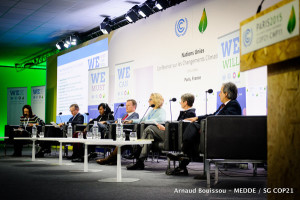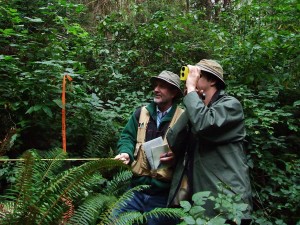COP21 Diary – Climate Progress: A better problem to have
By Laurie Wayburn, President of Pacific Forest Trust
 The annual United Nations Climate Change Conferences have tended to feel a little the same: The same urging of scientists, nongovernmental organizations, and island nations that we must act to combat climate change, at scale, now.
The annual United Nations Climate Change Conferences have tended to feel a little the same: The same urging of scientists, nongovernmental organizations, and island nations that we must act to combat climate change, at scale, now.
This conference is different. Progress is being made.
The business community is here. There is frank acknowledgment of the global increase in average temperatures by 1 degree Celsius. There are major new supply-chain commitments of specific companies to achieve carbon neutral products from farm to supermarket shelf, such as with Dannon. The World Bank even stated that, “You can see the world we’ve created at 1 degree rise of temperature. Imagine the disasters at 2 degrees. It’s unacceptable.”
The talk is not about hypotheticals like if we got out of the classic fossil fuel business, there would be winners and losers in the energy field with “stranded assets” where investments in those industries would not pay off. Instead, the discussion is how to deal with stranded assets. The transition is firmly begun.
It’s no longer an academic concept that the transition to lower CO2 levels should integrate human rights and social justice; now it’s clear this is essential.
The recognition that we cannot meet our 2 degree goals without sustaining and restoring forests for the long term is front and center, not just coming from voices on the sidelines of power. The discussions no longer focus on the tension between using forests for carbon and converting forest land for agriculture for people. Instead of forests versus people, the discussions are centered around forests and people.
What are the approaches to managing forests for climate that are rigorous and practical, and that support landowners in their overall stewardship of forests for their larger ecosystem benefits? California pioneered forest management policies and is recognized as the global standard for offset projects—like the REDD+ for both climate benefits as well as market and target compliance.
 The forest projects developed for the California system, of which the Pacific Forest Trust managed van Eck forest, was the first, is the standard-bearers and the harbinger of what can be done globally. California carbon offset projects showed that the standards of accounting and verification, protecting native forests, and ensuring permanent benefits, were feasible. Now, there is the promise that those standards can be implemented globally.
The forest projects developed for the California system, of which the Pacific Forest Trust managed van Eck forest, was the first, is the standard-bearers and the harbinger of what can be done globally. California carbon offset projects showed that the standards of accounting and verification, protecting native forests, and ensuring permanent benefits, were feasible. Now, there is the promise that those standards can be implemented globally.
The next step is to take this approach to the forest sector level—to the landscape. Here too, California is the global laboratory, as we enter into the second investment period of AB 32 revenues, the approaches and principles enumerated show enormous promise that California will continue to set the global example.
View Other COP21 Posts:
- Reaching a Global Agreement at COP21 – December 7, 2015
- Sky High Ambitions for Climate Solutions – December 4, 2015
Photo Credits:
Photo #1: Press Conference on the Action Day for Forests at the Paris Climate Talks by Aranaud Bouissou
